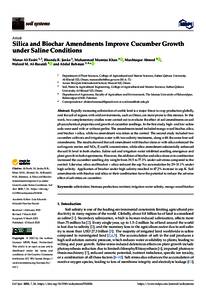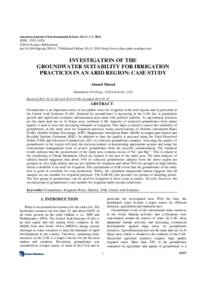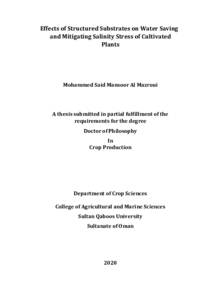Document
Silica and biochar amendments improve cucumber growth under saline conditions.
Contributors
Janke, Rhonda R., Author
Khan, Muhammad Mumtaz., Author
Ahmed, Mushtaque., Author
Al-Busaidi, Waleed M., Author
Rehman, A., Author
Publisher
Soil Systems.
Gregorian
2023-03
Language
English
English abstract
Rapidly increasing salinization of arable land is a major threat to crop production globally,
and the soil of regions with arid environments, such as Oman, are more prone to this menace. In this
work, two complementary studies were carried out to evaluate the effect of soil amendments on soil
physicochemical properties and growth of cucumber seedlings. In the first study, high- and low-saline
soils were used with or without perlite. The amendments tested included mango wood biochar, silica,
and biochar + silica, while no amendment was taken as the control. The second study included two
cucumber cultivars and irrigation water with two salinity treatments, along with the same four soil
amendments. The results showed that soil amendment with biochar alone or with silica enhanced the
soil organic matter and NO3
, P, and K concentration, while silica amendment substantially enhanced
the soil Si level in both studies. Saline soil and irrigation water inhibited seedling emergence and
plant growth in both experiments. However, the addition of biochar and silica alone or in combination
increased the cucumber seedling dry weight from 39.5 to 77.3% under salt stress compared to the
control. Likewise, silica and biochar + silica reduced the sap Na accumulation by 29–31.1% under
high salinity. Application of biochar under high salinity resulted in 87.2% increase in sap K. Soil
amendments with biochar and silica or their combination have the potential to reduce the adverse
effect of salt stress on cucumber.
Member of
Category
Journal articles



